A formula that shows its age
Anita Brookner
BACK WHEN WE WERE GROWNUPS
by Anne Tyler Chatto, £15.99, pp. 273, ISBN 070117286X
Anne Tyler's protagonists are dutiful, wistful people who, after a lifetime of looking after others, plan a timid and almost overlooked rebellion, such as walking away from a family picnic, or contacting a longlost friend. Rebecca Davitch has every excuse for leaving her nearest and dearest, since they all have names like Patch, Min Foo, NoNo, Jeep, Zeb, Troy, Hakim and Dixon. These irritating people, as irritating as their names, are the extended family of a typically hapless matriarch, a professional party organiser who is more successful than the reader at distinguishing between her daughter, her stepdaughters, their children, and their ever-changing partners.
SO abrupt is the opening chapter that I suspected this of being an early novel, a blueprint for the mature Tyler; even the title seems anachronistic. Yet as I read on the familiar ease and charm of the style, the seamless and apparently artless storytelling, and the equally familiar setting of suburban Baltimore, overcame any initial resistance I might have felt. I knew that the heroine, Rebecca, in her clumsy skirts and blouses, would at some point seek a way out of her normal life, and leave the partyorganising to Patch or MM Foo or even Poppy, the 100-year-old brother of her former father-in-law. She would do this by behaving out of character, by means of various improvisations, by making the odd telephone call, and by arranging a reunion with a man who was promising but insufficiently decisive.
Away from her normal duties our heroine is completely inexperienced. She is 53 years old and overweight, impulsive and badly dressed: she is Everywoman. So far, so good. Particularly impressive is her inno cence, which is the fantasy that Anne Tyler's readers have come to expect. An atmosphere compounded of high school, of college campus, of a big old family house, and the kindness of strangers is also provided. Thus the narrative is a sort of wishfulfilment even before the action gets under way.
What Rebecca does is contact a former boyfriend, one she knew 'back when we were grownups', i.e. adolescents. This may be unwise, but in this sunny world there are no ill-considered motives or base curiosity or even sexual nostalgia. A meeting takes place and Rebecca sees that the charming young man, the one she thinks she should have married, has become even more adolescent than he was when she first knew him, although he now has white hair and yellowing teeth. Worse, he has turned into the nerd he threatened to become. He cooks the week's supply of chilli on Sunday afternoons and stores it in cartons. He lives in a mess of old newspapers. He has a hostile daughter with a stud in one nostril and a ring in one eyebrow. Choosing to overlook these features, Rebecca invites him to a family reunion, summoning her offspring and their partners to a formal dinner, at which they all behave as carelessly as they usually do. The putative fiancé is charmed by this panorama of togetherness, in the course of which Rebecca changes her mind. It is Saturday evening: she dismisses poor Will and sends him off to carry out his chilli-making routine which can be fitted in quite comfortably on the following day. She has no conscience about this, and does not consider that she has raised expectations she will not fulfil. There is no blame in Anne Tyler's novels; she has elevated insouciance to a fine art. And this is delightful to the reader who is encouraged to cultivate the same sense of weightlessness.
The sad fact is that even the most experienced author can go a book too far. The impulse to write is so strong that considerations of what is still suitable can be overlooked. And Anne Tyler is such an enchanting novelist that one reads her with all one's critical faculties in abeyance. For although this novel is as accomplished as ever there are signs that the formula may be showing its age. The unease aroused by the title is compounded by the feeling throughout the book that it is still 1960, that there is no context, and, more important, no consequences. This notion is so entirely acceptable that the novel is sure to be a success.
And it ends more or less happily. It took the nerd to see what was coming; certainly Rebecca remains in the dark throughout. At yet another party her least ineligible relative invites some sort of rapprochement. The story is thus brought to a satisfying and successful conclusion. One would not have it otherwise. But if this is to be a romance one might wish that the formula had been honoured with a few difficulties encoun
tered along the way, for what is a romance without difficulties? Anne Tyler has done what she does best, offering a fiction that flatters our expectations. She has allowed her heroine to be both impulsive and improvident, and has let her get away with it. One might have longed for fewer parties and more straight talking. But if the almost happy ending is a little undeserved few will complain, for few would deny the lasting appeal of such an outcome. In the novel it works, just. Real life, or even a closer account of it, is not so accommodating.











































































 Previous page
Previous page